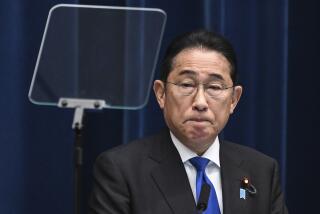3 Japanese Rivals Can’t Agree on 1 : May Force Party’s Lawmakers to Choose Nakasone Successor
- Share via
TOKYO — The three political leaders aspiring to succeed Yasuhiro Nakasone as Japan’s prime minister agreed Saturday to make an 11th-hour attempt Monday to avoid a showdown vote that would force the members of the ruling Liberal Democratic Party in Parliament to choose among them.
The move left Noboru Takeshita, 63, secretary general of the ruling party, the apparent front-runner by virtue of the number of his backers within the party. But political analysts were still making no bets in the closest--and most gentlemanly--battle in years to choose a new prime minister.
Takeshita had insisted that the decision be reached in voting by the 445 ruling party members of both houses of Parliament. But, after meeting with the two other hopefuls, Shintaro Abe, 63, the party’s executive council chairman, and Finance Minister Kiichi Miyazawa, 68, he said he was willing to settle the choice through talks.
Emerging from their fourth three-way meeting in the nine days since filing their applications for the ruling party’s presidency--and thus the national premiership--the three leaders indicated they had all but abandoned efforts to reach a decision themselves.
Nakasone May Decide
Instead, they said they will decide Monday whether to entrust Nakasone, 69, whose term as party president ends Oct. 30, with choosing one of them as his successor.
By virtue of the party’s majority, the new party president will later be elected prime minister by Parliament. Before leaving to spend Saturday night and today in his mountain retreat on the outskirts of Tokyo, Nakasone said he would be willing to assume the task of “adjustment,” but only if all three leaders entrusted the decision to him with no strings attached.
Miyazawa, seeing his best chance in a Nakasone appointment, said he was willing to give the prime minister carte blanche, but Takeshita and Abe refused to commit themselves Saturday.
Failure to reach an agreement Monday would force the party to go through with its possibly rancorous vote in a caucus scheduled for Tuesday. A runoff would be held immediately if none of the three won a majority after the first round of secret balloting.
With 223 votes needed for a majority, Takeshita commands a faction of 114 members, while Miyazawa heads a group of 89. Abe has 86 followers in his faction.
Nakasone, with 87 followers, and Toshio Komoto, a former Economic Planning Agency director, with 31, command the other major party factions, neither of which is running a candidate of its own. Komoto, however, has thrown his support to a so-called Takeshita-Abe alliance, which so far has produced no decision on which of the two would bow out in favor of the other.
Abe Won’t Withdraw
Abe told a meeting of his faction Saturday that he would not withdraw from the race in favor of Takeshita despite their alliance.
“I intend to treat our personal friendship with importance, but personal feelings and one’s public position are different,” Abe said. “For the sake of the nation, I will refuse to yield. I intend to continue fighting, with confidence, to the end.”
Political analysts said that either Abe or Miyazawa still might throw his support to the other, giving the recipient the upper hand over Takeshita.
It was the first time that ruling party candidates had tried personally to reach an agreement on a new leader. In all previous appointments--conducted without votes--third-party mediators had led the discussions.
It also was the first time in years that so little acrimony had been created by a power struggle.
Years ago, as lieutenants serving earlier factional leaders, Takeshita, Abe and Miyazawa pledged to maintain party harmony and cooperate with each other, regardless of who among them became prime minister. None of the three has offered a word of criticism of his rivals, and all three have declared they would carry on Nakasone’s policies.
The only acerbic note so far has come from Susumu Nikaido, 78, a former party vice president who withdrew from the race Oct. 7 when it became clear that he could not secure the recommendations of 50 ruling party members of Parliament needed to run. He told a group of Miyazawa supporters Saturday that he would resign his seat in Parliament if Takeshita were elected prime minister.
Nikaido condemned Takeshita, who set up his own faction in July, for refusing to remain loyal to former Prime Minister Kakuei Tanaka, who suffered a stroke in 1985.
Miyazawa is strongly endorsed by the nation’s bureaucrats and businessmen as the brightest and most able policy-maker, but he is rated weakest in party support. Abe’s strongest point is his lack of enemies, while Takeshita is rated high in his ability to raise funds. Both Abe and Takeshita are viewed as passive leaders prone to vagueness in public statements.
Abe, as Nakasone’s foreign minister for more than three years, built close personal relationships with U.S. leaders, especially Secretary of State George P. Shultz.
More to Read
Sign up for Essential California
The most important California stories and recommendations in your inbox every morning.
You may occasionally receive promotional content from the Los Angeles Times.













